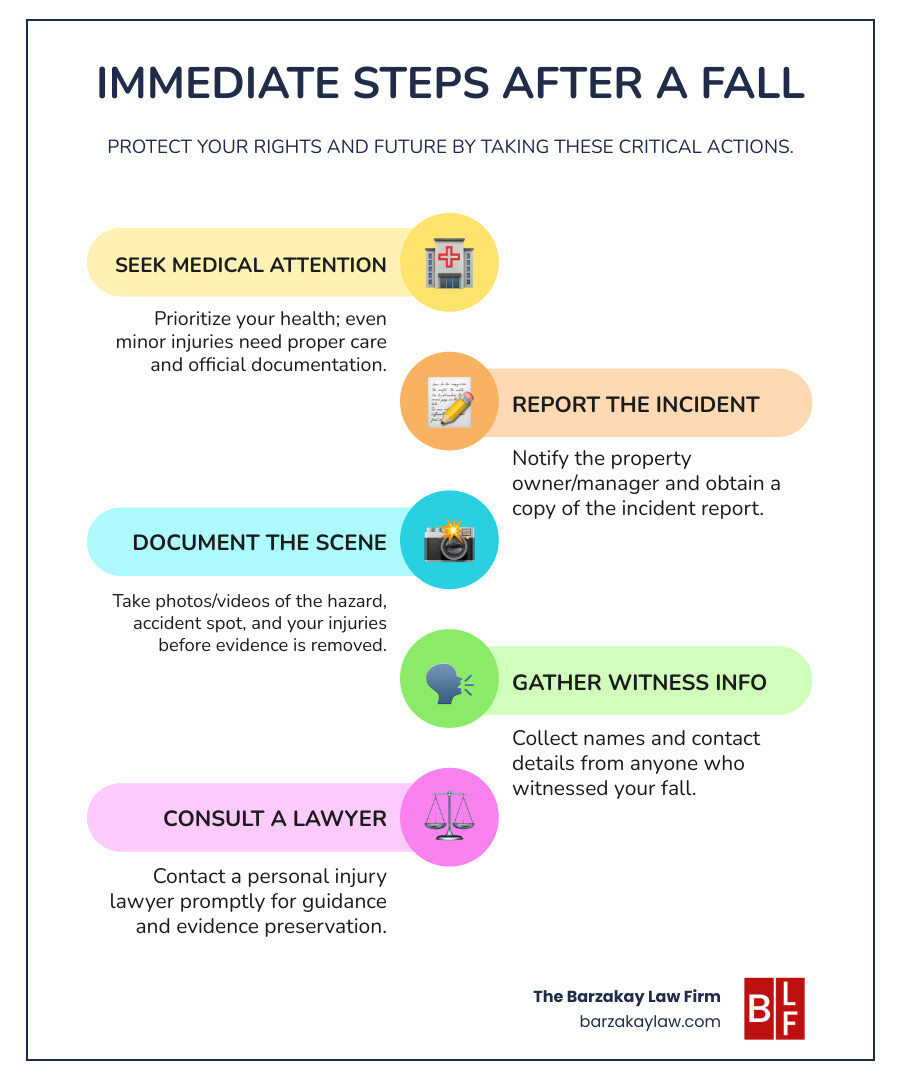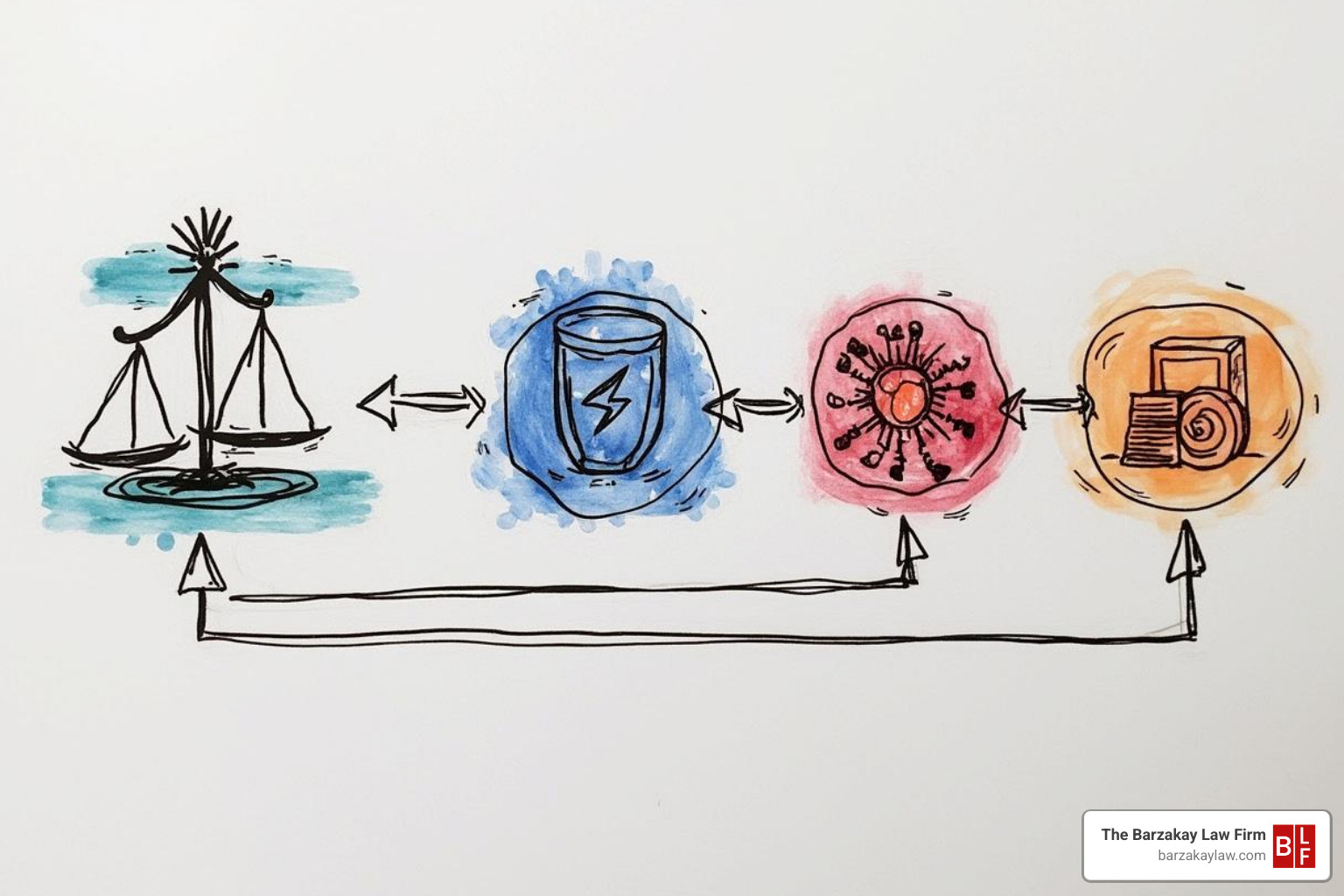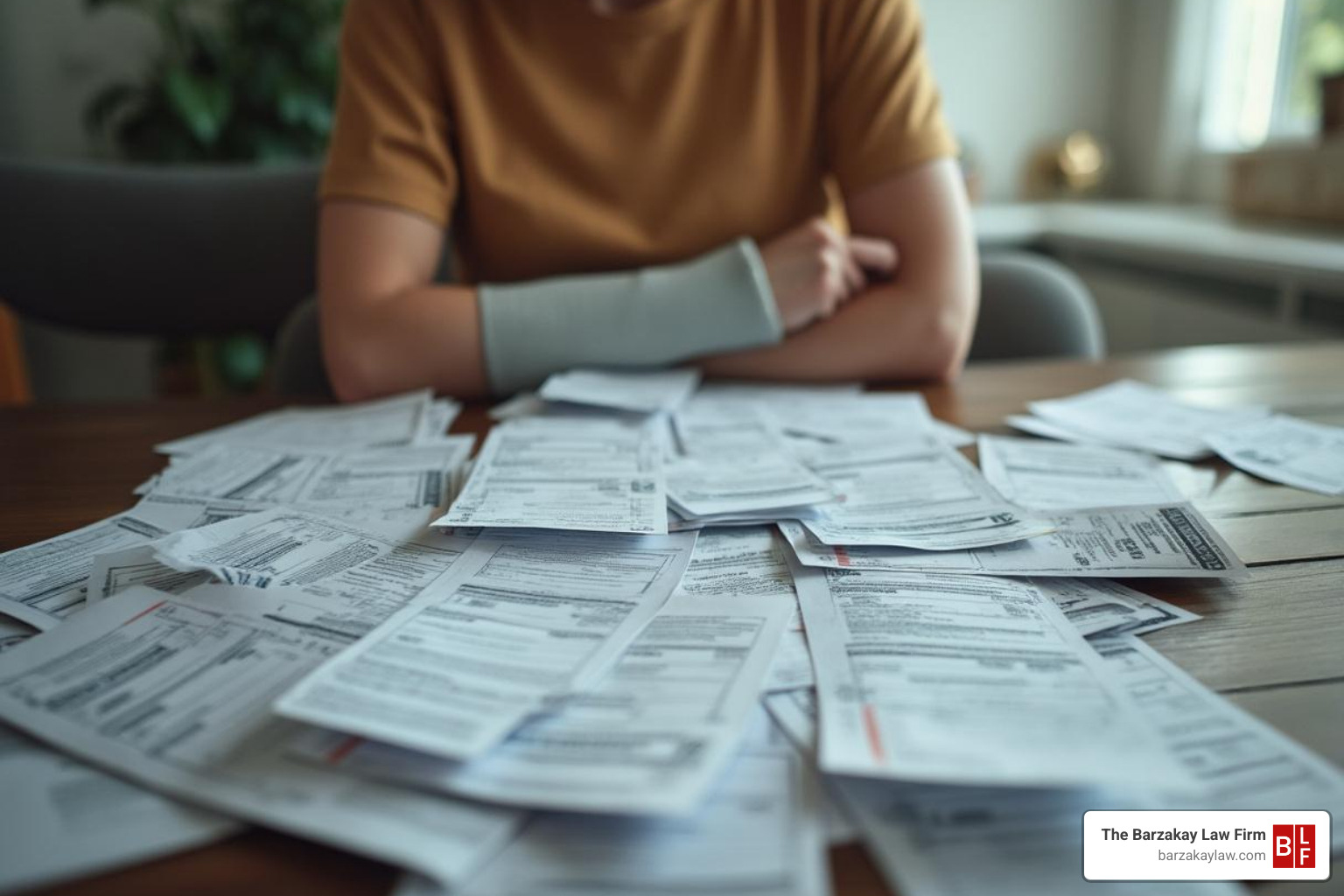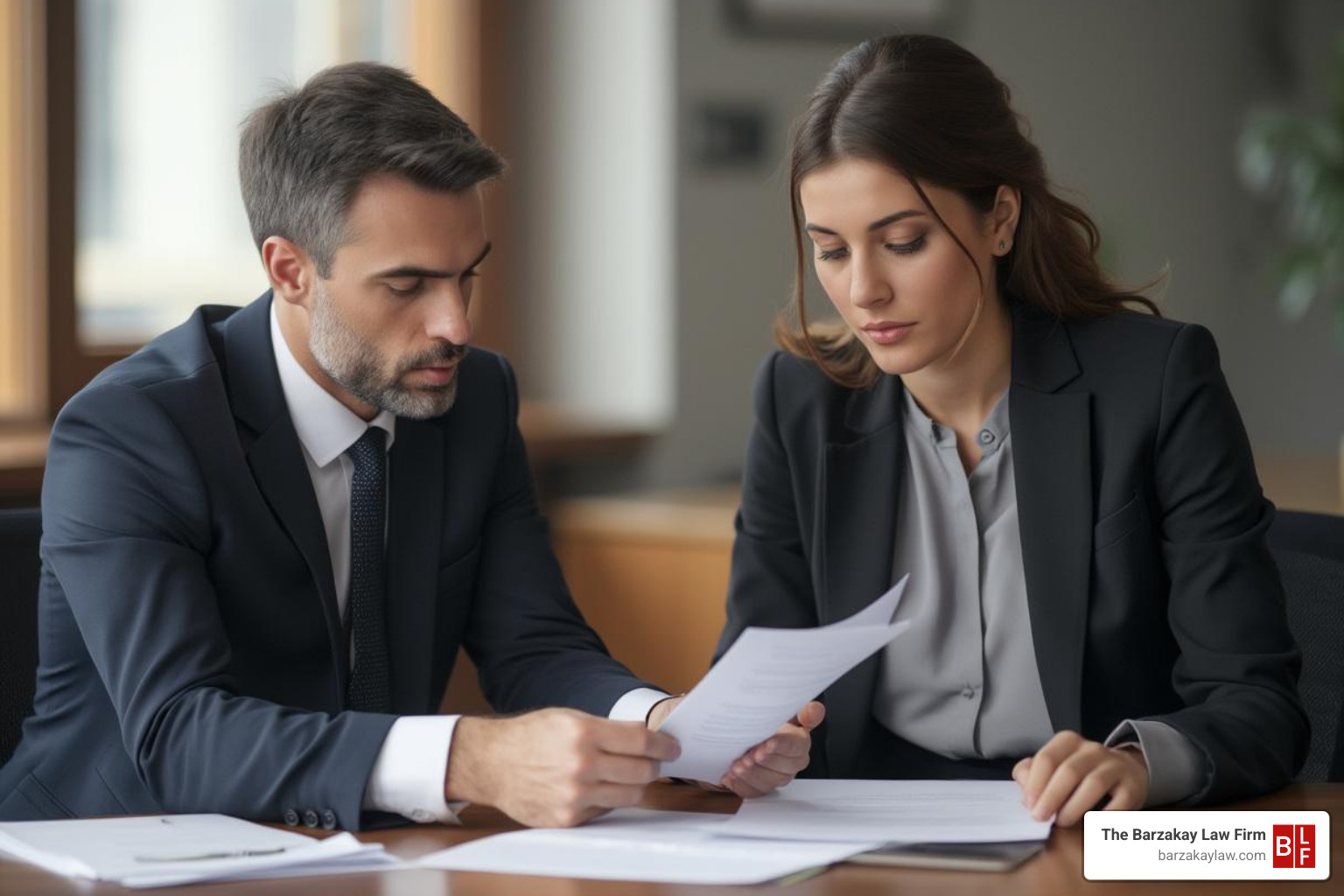When Accidents Happen: Your First Steps After a Fall
An unexpected fall can be overwhelming. Understanding your slip and fall legal advice options is crucial to protect your rights and future.
Here are the critical first steps you should take after a slip and fall accident:
- Prioritize Your Health: Seek medical attention immediately, even for minor injuries. This ensures proper care and creates an official record.
- Report the Incident: Notify the property owner or manager about your fall. Ensure an incident report is created and get a copy.
- Document the Scene: Use your phone to take photos or videos of the hazard and your injuries. Hazards can be removed quickly.
- Gather Witness Information: If anyone saw your fall, get their name and contact details.
- Consult with a Lawyer: Contact a personal injury lawyer promptly for guidance.
Slip and fall accidents can be traumatic, leading to pain, lost wages, and medical bills. You don’t have to face the legal system alone. This guide will simplify the process, explain your rights, and help you seek the compensation you deserve.
Easy slip and fall legal advice glossary:
The First 24 Hours: Critical Steps to Protect Your Claim
The moments after a fall are disorienting, but your actions in the first 24 hours are critical. They lay the groundwork for any future slip and fall legal advice you might need and can strengthen your claim.
Seek medical attention immediately, even for what seem like minor injuries. Some conditions, like concussions or internal injuries, aren’t always obvious. A doctor’s visit ensures you receive care and creates an official medical record linking your injuries to the fall—a vital piece of evidence.
Once your health is addressed, report the incident to the property owner or manager. Ask them to create an official incident report and get a copy. When giving your statement, be accurate but concise. Crucially, do not admit fault or speculate on the cause. A simple comment like “I’m so clumsy” can be used against you.
Next, document the scene. This is time-sensitive, as hazards can be cleaned up or repaired. Use your smartphone to take photos and videos of the specific hazard that caused your fall, the surrounding area, any warning signs (or lack thereof), and the lighting conditions. Also, photograph your injuries and any damaged clothing.
If anyone witnessed your fall, gather their names and contact information. Unbiased accounts can corroborate your story.
Finally, preserve evidence. Keep the shoes and clothing you were wearing, without cleaning them. If you suspect there might be surveillance video, promptly request its preservation, as many systems record over old footage. Our guide on Documenting an Injury in a Public Place offers more details.
What Evidence is Crucial to Collect?
To build a strong foundation for your slip and fall legal advice case, collecting the right evidence is paramount. This includes photos and videos of the hazard and your injuries. Make sure to secure witness names and contact information, as their testimony can be invaluable. Always obtain a copy of the incident report from the property owner. Don’t forget to keep your shoes and clothing from the accident, as they can tell a story of their own. And, perhaps most importantly for your recovery and your claim, diligently collect all medical records and bills related to your injuries. Each piece of evidence helps paint a clearer picture of what happened and the impact it has had on your life.
Proving Your Case: How Liability and Negligence Work in Florida
In Florida, slip and fall cases are governed by premises liability law. This means property owners must keep their spaces reasonably safe for visitors. To have a successful claim, you must prove the owner’s negligence caused your accident. This is where sound slip and fall legal advice is invaluable.
To prove negligence, we must show four things: the owner owed you a duty of care; they breached that duty by failing to act reasonably; this breach directly caused your fall and injuries; and you suffered damages (like medical bills or lost wages) as a result.
A key part of proving negligence in Florida is showing the property owner had “actual knowledge” or “constructive knowledge” of the danger. Actual knowledge means they knew about the hazard. Constructive knowledge means they should have known about it because it existed long enough that a reasonable owner would have finded and fixed it.
Florida Statute 768.0755 specifically addresses cases involving “transitory foreign substances” (like a spill) in businesses. For these, we must show the business knew or should have known about the substance and failed to address it. You can find more information on our website about Proving Fault in Slip and Fall Accidents and learn more about our dedicated Florida Premises Liability & Slip and Fall Attorneys.
Understanding the Property Owner’s Responsibility
The owner’s responsibility varies by property type:
- Commercial Property: Stores, malls, and restaurants have a high duty of care. They are expected to conduct regular inspections, promptly clean up spills, and use adequate warning signs.
- Residential Property: Homeowners must keep their property reasonably safe for guests and warn them of known dangers.
- Government Property: Cases involving public property like parks or sidewalks are more complex, with specific rules and shorter deadlines for filing a claim.
In any scenario, the owner’s duty is to take reasonable steps for safety. This includes regular inspections, addressing hazards, using warning signs, ensuring adequate lighting, and maintaining the property. A fall on someone’s property does not automatically mean the owner was negligent; we must prove their failure to act reasonably led to your injury.
Understanding Your Claim’s Value and Potential Problems
It’s natural to wonder, “What is my case worth?” The value of a slip and fall claim is calculated based on the unique factors of your situation. We assess all your damages to seek the fair compensation you deserve.
Common Injuries and What Compensation You Can Claim
Slip and fall accidents can cause injuries ranging from minor to severe, including:
- Sprains and Fractures: Commonly affecting ankles, wrists, and hips.
- Back and Neck Injuries: Such as herniated discs or pinched nerves, which can cause chronic pain.
- Traumatic Brain Injuries (TBIs): A blow to the head can cause a concussion or more serious brain injury. For these cases, a Traumatic Brain Injury Lawyer can provide guidance.
When we figure out your potential compensation, we consider two main types of damages:
- Economic Damages: These are calculable financial losses, including past and future medical expenses, lost wages and future earning capacity, and other out-of-pocket expenses.
- Non-Economic Damages: These are intangible losses, such as pain and suffering, loss of enjoyment of life, and loss of consortium for family members.
The overall value of your claim is deeply influenced by The nature and extent of your injuries. We also have helpful resources on How to Maximize Your Settlement Offer.
Navigating Defenses and Florida’s Comparative Fault Rule
Property owners and their insurers often use defenses to reduce or deny a claim, such as:
- “Open and Obvious” Hazard: Arguing the danger was so clear you should have avoided it.
- Blaming the Victim: Suggesting your own carelessness, like being distracted by your phone, contributed to the fall.
- Lack of Notice: Claiming they didn’t know and couldn’t have reasonably known about the hazard.
This leads to Florida’s “modified comparative negligence” rule. If you are found partly at fault, your compensation is reduced by your percentage of fault. For example, if your damages are $100,000 and you are 20% at fault, your award is reduced to $80,000. Crucially, if you are found to be 50% or more at fault, you cannot recover any damages. This rule highlights why getting solid slip and fall legal advice is so important. You can learn more about Comparative Fault in Florida Personal Injury Cases and Understanding comparative negligence.
Insurance companies aim to pay as little as possible. Having a legal team on your side is valuable to counter their tactics and protect your rights.
The Legal Process: Timelines and Why You Need Slip and Fall Legal Advice
Navigating the legal system after a slip and fall can be complex, with strict deadlines and tough negotiations with insurance companies. Our goal is to guide you through the process, protecting your rights and handling your claim effectively.
If an insurer denies your claim, it’s not the end. We can help you understand What to Do if Your Personal Injury Claim is Denied in Florida.
Florida’s Statute of Limitations: Critical Slip and Fall Legal Advice on Deadlines
One of the most critical pieces of slip and fall legal advice concerns the statute of limitations—a strict deadline for filing a lawsuit. Missing this deadline usually means losing your right to seek compensation.
In Florida, you generally have two years from the date of the accident to file a personal injury lawsuit. However, important exceptions exist. Claims against a government entity have much shorter notice periods. It is vital to act quickly, as evidence like surveillance video can disappear and witness memories can fade. Delaying can also make it harder to link your injuries directly to the fall.
The Role of a Lawyer: Getting Professional Slip and Fall Legal Advice
You might ask if you need a lawyer. For serious injuries, having legal representation can make a significant difference. Here’s how we can help:
- Investigate your case: We gather reports, videos, and statements to determine if negligence caused your fall.
- Preserve crucial evidence: We act quickly to secure evidence like surveillance footage before it’s erased.
- Calculate your total damages: We work with medical and financial professionals to assess all your losses.
- Handle all communication with insurance adjusters: We protect you from tactics designed to devalue your claim.
- Negotiate a fair settlement: Most cases settle out of court. We fight for a settlement that covers your losses.
- Represent you in court: If a fair settlement isn’t possible, we are prepared to file a lawsuit and advocate for you at trial.
We understand legal fees are a concern. The Barzakay Law Firm works on a contingency fee basis, meaning you pay no upfront fees. We only get paid if we win your case, from a percentage of the compensation we recover for you. Learn more about Slip and Fall Lawyer Fees on our site.
Frequently Asked Questions about Slip and Fall Claims
It’s natural to have questions after a slip and fall. Here, we provide clear slip and fall legal advice on some common concerns.
What if my slip and fall accident happened at work?
If you were hurt on the job, your claim is typically handled through the workers’ compensation system. This system provides medical and wage benefits regardless of fault and is usually your “exclusive remedy,” meaning you cannot sue your employer.
However, there are exceptions. If a third party—like a contractor or equipment manufacturer—was responsible for the hazard, you might have a separate personal injury claim against them. This allows you to seek damages not covered by workers’ comp, such as for pain and suffering. It’s wise to consult a Workers’ Compensation Lawyer to explore all your options.
Should I give a recorded statement to the property owner’s insurance company?
In most cases, no. This is critical slip and fall legal advice. You should avoid giving a recorded statement to the other party’s insurer until you have spoken with a lawyer.
Insurance adjusters are trained to protect their company’s interests, not yours. They may ask leading questions to minimize your injuries or shift blame to you. Your words can be taken out of context and used against your claim. Politely decline and direct them to your attorney. We will handle all communications to protect your rights.
How much is my slip and fall case worth?
There is no “average” settlement amount, as each case is unique. The value depends on several factors:
- Severity of Injuries: More serious injuries requiring extensive medical care generally lead to higher value claims.
- Total Medical Expenses: This includes all past and future costs for treatment and rehabilitation.
- Lost Wages: Compensation for time missed from work and any impact on your future earning capacity.
- Pain and Suffering: The physical and emotional distress caused by the accident.
- Strength of Evidence: Clear proof of the property owner’s negligence strengthens your case.
- Comparative Negligence: Your compensation will be reduced by your percentage of fault, if any.
- Insurance Policy Limits: The available insurance coverage can cap the potential recovery amount.
We conduct a thorough review of these factors to provide an honest assessment of your Slip and Fall Injury Claim.
Conclusion: Taking the Next Step with Confidence
Slip and fall accidents can disrupt your life with pain, stress, and unexpected expenses. Understanding your rights is the first step toward recovery and securing the compensation you deserve.
Remember these key points from our slip and fall legal advice:
First, act quickly. Prompt action in seeking medical care, documenting the scene, and getting legal guidance is crucial for protecting your claim.
Second, document everything. Photos, incident reports, witness information, and medical records are all vital pieces of evidence that help tell your story.
Finally, understand your rights. If your fall was caused by someone else’s negligence, you have the right to seek compensation for your injuries and related costs.
At The Barzakay Law Firm, we are dedicated to helping people steer personal injury law. We work on a contingency fee basis, so you pay no upfront costs. We only get paid if we win your case. This allows you to focus on healing without financial worry.
If you or a loved one was hurt in a slip and fall in Florida, including in Hollywood, Miami, Boca Raton, Sunrise, Orlando, or Fort Lauderdale, please connect with us.
Contact a Hollywood Slip and Fall Lawyer today for a conversation about your situation. We are ready to help you move forward with confidence.




